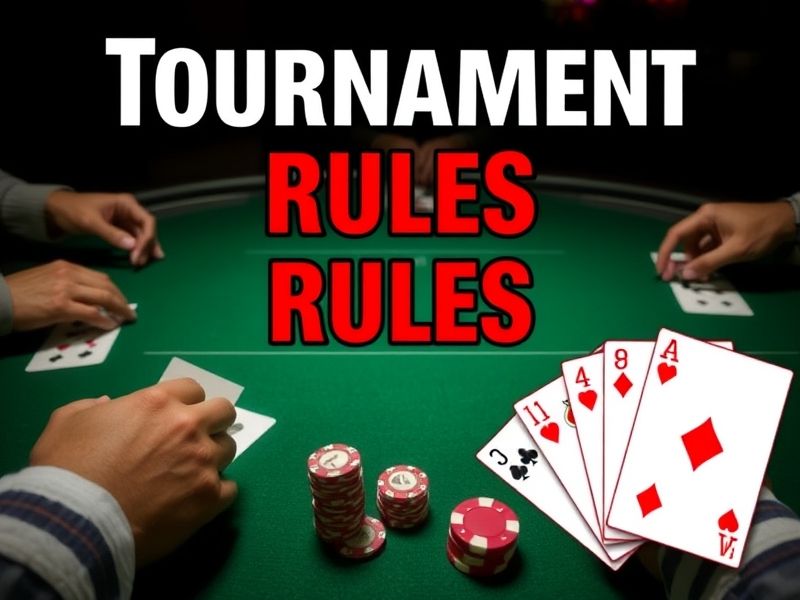
poker rules - Tournament Rules
Mastering Poker Tournaments: Professional Strategies and Practical Tips
Dear poker enthusiasts, when you see this title, do you already envision yourself shedding the label of a beginner and becoming a revered poker master? "Conquering poker tournaments" may sound like a distant dream, but with the right strategies and practical skills, everything falls into place. Today, let’s explore how to navigate poker tournaments with ease, transforming from occasional winners to absolute champions, ensuring every day at the table is filled with confidence and glory.
Chip Management: Control Isn’t Everything, but Mastery is Possible
Chip management is the cornerstone of any poker tournament. Imagine yourself on a vast ocean, where each chip is a tiny tool that can create waves and attract attention. In the early stages, as a "diver," your goal is to gather as many chips as possible, much like collecting floating seaweed. As the tournament progresses, the number of chips will dwindle, and more players will eye your stack with envy.
I recommend adopting a cautious approach in the early stages, gradually accumulating chips rather than making large bets to show off, which reduces unnecessary risks. As the tournament advances, strategically "release" some chips as bait to lure opponents. Remember, in the middle and late stages, operate conservatively, maintaining a solid chip stack until the final decision-making moment when you can make your final push.
Aggressive or Conservative? Wise Choices Make the Ultimate Champion

Another core aspect of poker tournament strategy is deciding whether to play aggressively or defensively. In the initial stages, players tend to be more aggressive, hoping to quickly increase their chip stack through bold bets. However, this approach can be fraught with pitfalls. In deeper stages, aggressive play can deplete your chips, while conservative play might label you as "weak." Finding the balance between the two is crucial.
Use data analysis to aid your decisions, paying attention to opponents' betting frequencies, amounts, and overall styles. If most players are overly aggressive, you might choose to observe conservatively, capitalizing on their impulsive moments to strike back. Conversely, if the overall play is cautious or if there’s significant divergence among opponents, seize the opportunity to bet more aggressively.
Adapting to Blind Levels: Finding Solutions in Challenges
Blinds are the "sharks" of poker tournaments, constantly devouring players' chips. Adapting to blind level changes is a key determinant of success. I suggest familiarizing yourself with the intensity of blinds, analyzing players' mindset shifts at different blind levels, and using this information to adjust your strategy.
In the low blind stages, be bolder with your bets, leveraging your chip stack advantage. However, as you enter the middle stages, become more cautious, focusing on defense and chip management. When you reach the high blind stages, increase your bets strategically, utilizing the final rounds for a strong offensive. Remember, adapting to blind changes means adapting to the rhythm of the game.
Survival Skills and the Path to Advancement
Don’t overlook survival skills in tournaments. In the early stages, focus on tracking and evaluating your position, the size of your chip stack, and player interactions. Gather as much information as possible to predict opponents' strategies. In the middle stages, pay attention to position, get accustomed to the concept of "Assess VS?", and become adept at interpreting opponents' tendencies in specific positions.
Persistence until the final stages gives you an additional advantage. At this point, minimize risks, focus on winning, and exploit opponents' anxiety and fatigue, using your experience and judgment to seize the initiative.
Conclusion
Anyone can become a legendary champion in poker tournaments. Through chip management, strategic aggression and conservatism, adapting to blind level changes, and survival skills at critical moments, each step is crucial. Remember, poker tournaments are not just about skill; they are a battle of psychology and wisdom. With each careful and brave move, you’ll understand that true winners are not just technical experts but those who can create order in chaos.
Join the ranks of those who conquer poker tournaments and become the protagonist of a story worth telling. Whether in the morning, afternoon, or night, as you navigate the tables, you’re already writing the prologue to your own victory.

